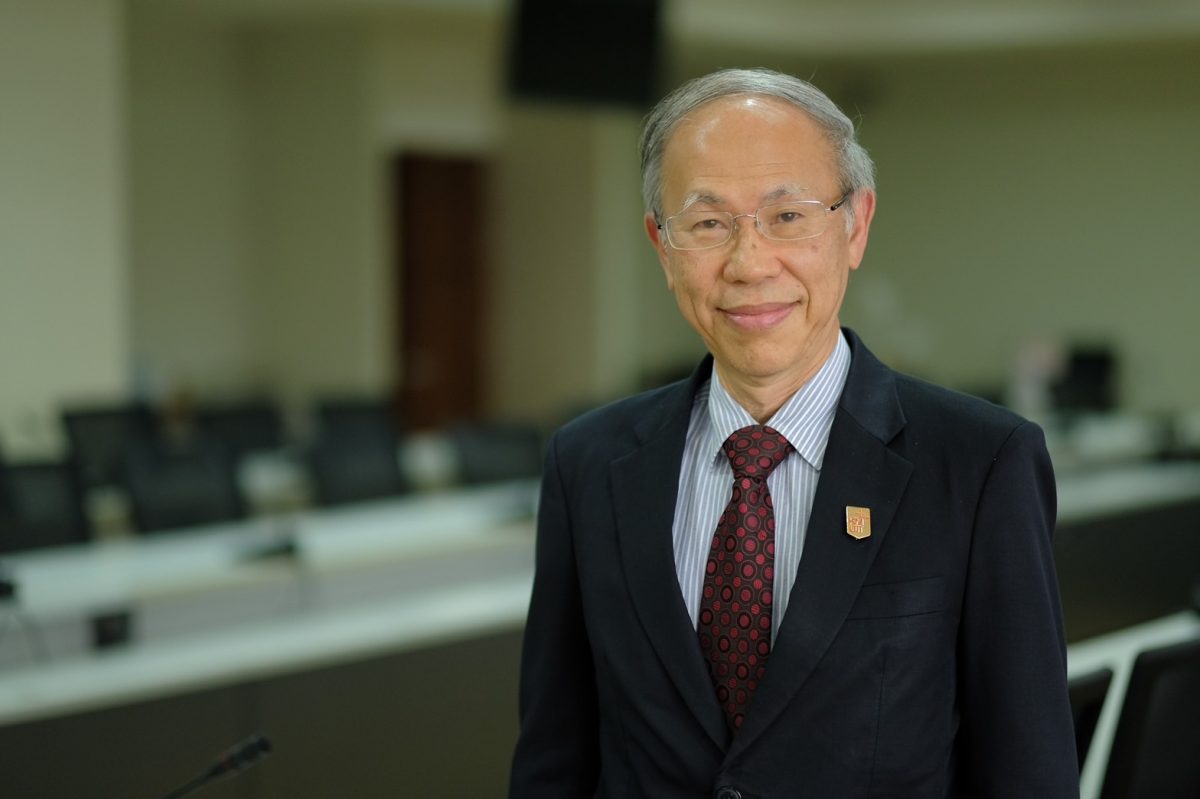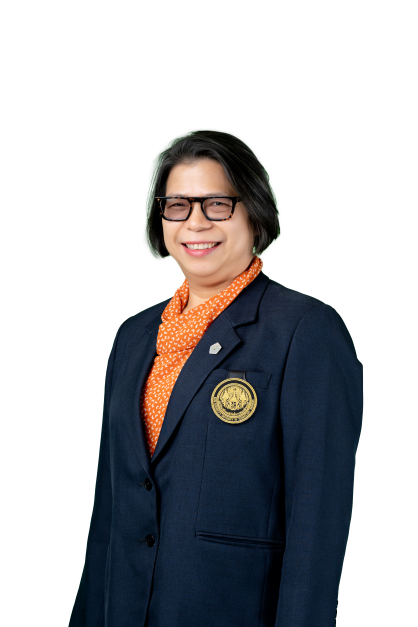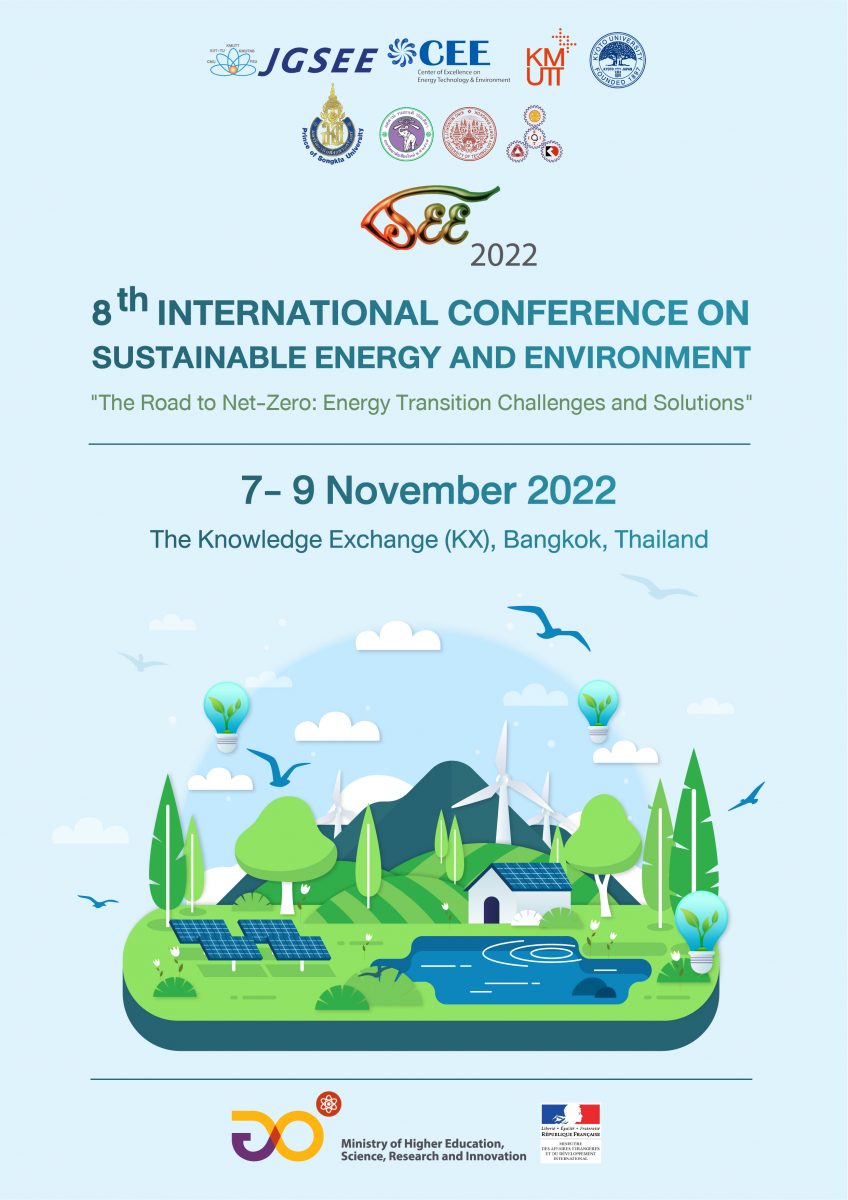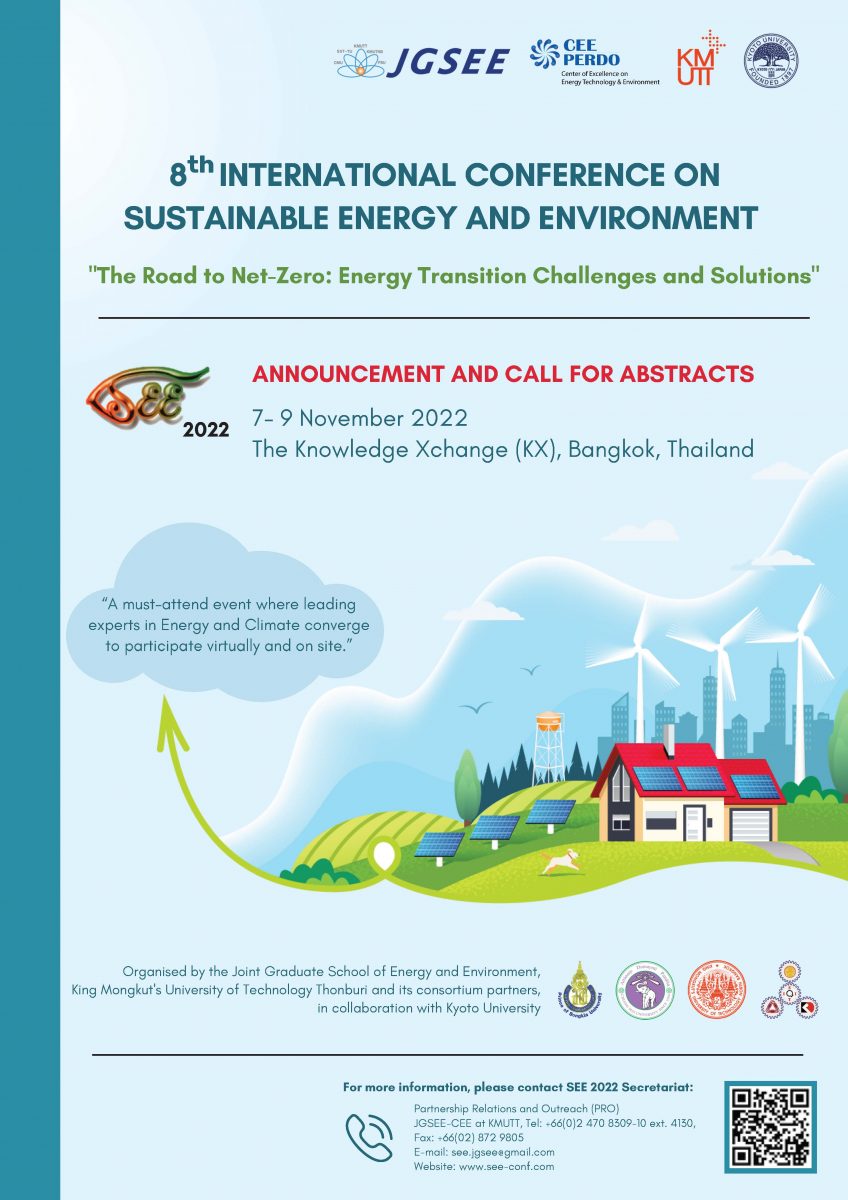The Joint Graduate School of Energy and Environment (JGSEE), a Center of Excellence on Energy and Environment at King Mongkut’s University of Technology Thonburi (KMUTT) together with its consortium of five Thai universities, in cooperation with Kyoto University, is going to host the 8th International Conference on Sustainable Energy and Environment from November 7-9, 2022, at the KX (Knowledge Exchange) Building, near WongWian Yai BTS Station.
The 3-day conference will focus on scientific and technological advances for achieving sustainable energy and environmental security. It will also provide an opportunity for academics and other experts from around the world to discuss pathways for halting global warming and mitigating climate change.
In early November 2021, recognizing the potentially catastrophic consequences of climate change caused by the release of vast quantities of greenhouse gases into the atmosphere, leaders from some 120 countries around the globe, including Thailand’s own Prime Minister, met at the 26th U.N. Climate Change Conference in Glasgow, Scotland (COP26). There they signed on to a declaration pledging to work toward carbon neutrality. Thailand has committed to achieving this goal by 2050 and to cutting greenhouse gas emissions (GHG) to net zero by 2065. To date, more than 130 countries have set, or are considering setting, a specific target of reducing emissions to net zero by 2050.

Prof. Dr. Bundit Fungtammasan 
Prof. Dr. Savitri Garivait
Assoc. Prof. Dr. Bundit Fungtammasan, the KMUTT Advisor to the President for Research and Innovation and Chair of the SEE 2022 Technical Committee, stated that the worsening climate crisis is forcing countries to accelerate action toward reducing GHG emissions. Goals are two-fold. Countries hope first to cut global GHG emissions by 45-50% by 2030, and second, to achieve net-zero by 2050. To meet these targets, countries must work together to cut emissions of carbon dioxide, which is the primary GHG, and absorb carbon dioxide already in the atmosphere as a result of human activity into carbon sinks. It is the urgency of the UN’s call to action that has inspired the theme of SEE 2022, which is “The Road to Net-Zero: Energy Transition Challenges and Solutions.”
In previous editions of the SEE conference, participants have already been addressing the issues of sustainable energy and the environment, which will eventually lead to emission reductions. However, what distinguishes SEE2022 from previous years is a change of conference format from onsite only to a hybrid one and an emphasis on technologies and
innovations that are critical for achieving Net-Zero promptly. Thus, out of the anticipated 200-250 participants, we expect 50% to be onsite while the remaining online. In terms of content, the conference will center around 5 key topics: Future Energy Systems; Bio-Circular Green Economy, with a particular focus on bioenergy and biomaterial production and consumption systems with the promise of solving global challenges such as climate change, loss of biodiversity, waste, and pollution; Smart Cities and Electric Mobility; Environmental and Climate Technologies and Management; and Energy and Climate Policy.
Dr. Bundit added that the topic of Future Energy Systems, in particular, would see papers featuring power system transformation. With the expected huge uptake of highly variable renewable energy (VRE), such as solar and wind, transforming the existing power grid to accommodate these new resources will be essential. Electricity infrastructure will need to integrate new technologies, such as smart grid, the Internet of Things, and hydrogen and energy storage to ensure greater system flexibility, stability, and reliability. New technologies are also needed to facilitate electricity trading and the development of new business models.
SEE 2022 will feature 10 keynote speakers from 7 different countries, including Austria, Australia, France, Germany, Japan, Thailand, and the US, all of them leading experts in their respective fields. They will be speaking on three thematic areas: 1) “On the Road to Net-Zero,” 2) “Smart Energy Systems and Cities,” and 3) “Circular Bio-economy.” In addition, at a Special Session, environmental experts will be presenting their latest research on “Waste Recycling and Waste Utilization” and “The Role of AFOLU (Agriculture, Forestry, and Other Land Use) in Net-Zero Emission Development”.
JGSEE’s Environment Chair and Secretary of the SEE 2022 Organizing Committee, Assoc. Prof. Dr. Savitri Garivait noted that in addition to future energy systems, the conference would examine several interesting environmental issues, such as waste recycling and waste utilization. A collaboration involving JGSEE-KMUTT, Kasetsart University, and Japan’s National Institute for Environmental Studies (NIES) has taken a special interest in issues relating to health and waste after the COVID-19 pandemic, an area expected to be a primary driver for BCG (Bio-circular Green Economy) policy-making at the national and international levels.
The Special Session devoted to the Role of AFOLU in Net-Zero Emission Development will examine how agriculture, reforestation, and other land use can function as a mechanism for absorbing carbon dioxide and setting countries on a course to achieving
their net-zero emission goals. Experts in attendance will be providing a detailed report on current environmental conditions in Thailand.
SEE 2022 has attracted academics, researchers, and representatives from government and business-sector organizations both in Thailand and abroad. Roughly 120 papers from 14 countries have been submitted, almost a quarter of them dealing with the topic of Bio-Circular Economic Models. Another 20% of the papers are on the subject of new energy systems. As in previous years, some Best Student Paper Awards will be given out based on the quality of oral presentation and their content.
For the first time, representatives from two of the world’s leading international journals on energy and environment, namely The Journal of Sustainable Consumption and Production (SCP) and The International Journal of Energy for a Clean Environment, will be in attendance, offering authors of papers presented at this year’s conference the possibility of publishing their work in these prestigious outlets.
The SEE 2022 Organizing Committee anticipates that this year’s conference will offer students and younger faculty members an opportunity to gain new insights and share their knowledge of new developments in fields related to energy and the environment. It is hoped that this event will spur greater interest among younger scholars in the drive to achieve net-zero. After all, the success or failure of this crucial undertaking will inevitably have a greater impact on younger generations than on their seniors. Finally, we are confident that the conference will open new opportunities for future academic collaborations aimed at furthering new developments in sustainable energy and the environment.

